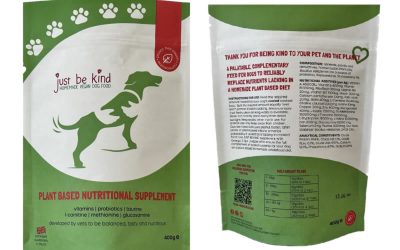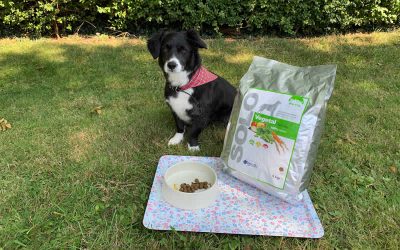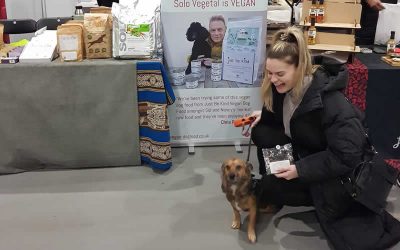zoonosis
noun: zoonosis plural noun: zoonoses
1. a disease which can be transmitted to humans from animals.
As we are all fully aware of the life-changing zoonosis virus Covid-19; we want you to be fully aware of the other dangerous zoonoses that could be in your home.
Most of these zoonoses will come from handling raw meat, but remember that most processed meat-based dry dog food biscuits (and treats) are sprayed with something called ‘digest’ which is basically a spray of either fish or ‘cast-offs’ from the meat and poultry industry to make your pet’s dry biscuits irresistible.
There are cases of dry food or treats (especially the raw hide treats and chews) causing transmission of diseases to people, so keep washing those hands and avoid them at all costs if you suffer from any immune-compromising conditions!
1. Coronavirus
Coronavirus is associated with humans eating animals and has made people aware of the term ‘zoonosis’ as it has changed all of our lives on such an unprecedented scale
“In late December, 2019, several patients with viral pneumonia were found to be epidemiologically associated with the Huanan seafood market in Wuhan, in the Hubei province of China, where a number of non-aquatic animals such as birds and rabbits were also on sale before the outbreak.”
2. E. Coli
Escherichia coli is a type of bacteria that normally lives in your intestines. It’s also found in the intestines of animals and is one of the main contaminants on uncooked meat or chicken. While many of us associate E. coli with food poisoning, you can also get pneumonia and urinary tract infections from different types of the bacteria. In fact, 75% to 95% of urinary tract infections are caused by E. coli.
3. Campylobacter
The British Food Standards Agency says that one of the main ways to get and spread campylobacter poisoning is through cross-contamination from raw chicken. For example, washing raw chicken can spread campylobacter by splashing it onto hands, work surfaces, clothing and cooking equipment.
Campylobacter is also found in red meat, unpasteurised milk and untreated water. Although it does not normally grow in food, it spreads easily. Campylobacter spp causes vomiting and diarrhoea among around 280,000 healthy people every year and can kill those with vulnerable immune systems. In 2018 there was a report of 27 dogs with suspected acute polyradiculoneuritis (APN) were found to be 9.4 times more likely to have faecal samples positive for Campylobacter spp. Campylobacter can be reduced or eradicated with adequate freezing and cooking of the affected chicken.
4. Salmonella
In the UK, Salmonella contamination of poultry was very prevalent in the 1990s, resulting in a programme which has reduced the prevalence to the targeted <2%. Sadly the introduction of raw feeding shows that 20% of frozen commercial raw food diets are contaminated by Salmonella spp that results in vomiting and diarrhoea in both pets and affected humans if affected.
Bowls used for feeding should be cleaned, although standard methods of cleaning bowls, including scrubbing with dish soap and bleaching, are inadequate to eliminate Salmonella.
5. Listeria
In humans, the symptoms of listeriosis include fever, muscle aches, and sometimes nausea or diarrhoea. If the infection spreads to the nervous system, symptoms such as headache, stiff neck, confusion, loss of balance, or convulsions can occur. Infected pregnant women may experience only a mild, flu-like illness although the infection can result in miscarriage, premature delivery, serious infection of the newborn, or even stillbirth. In dogs it is often clinically silent, although it has been reported in association with abortion in dogs.
The van Bree, et al (2018) study found Listeria monocytogenes in 43% of the samples of frozen commercial raw pet food, and in earlier studies Listeria (and Salmonella) were isolated from were isolated from raw foods and jerky-type treats but not dry commercial foods. Listeria is also transferred to humans from milk or cheeses (especially unpasteurised cheeses) affected with Listeria.
6. Antibiotic resistant bacteria
Extended spectrum β lactamase (ESBL)- producing E. coli and other antibiotic resistant bacteria. A Dutch study found dogs eating raw meat were more likely to shed ESBL-producing Enterobacteriaceae.
The presence of antibiotic resistant bacteria in raw food diets and in the faeces of pets poses a potentially serious public health risk as if a human or pet becomes infected then there would be no effective antibiotic that could be used to fight the infection and organ failure due to infection can result in deaths.
7. Parasites in meat
Parasites that may be present in raw meat in include Toxoplasma gondii, Sarcocystis, Neospora caninum, Toxocara canis, Taenia and Echinococcus. The van Bree, et al (2018) study found 6% of frozen raw petfoods contained Toxoplasma gondii, 11% contained Sarcocystis cruzi and another 11% had Sarcocystis tenella.
Pregnant women are always advised to wash their hands when preparing any raw meat as Toxoplasma gondii can cause miscarriages. The problem is also as concerning when gardening so gloves should always be worn in case of coming into contact with infected faeces.
8. Tuberculosis
Thankfully cases of Mycobacterium bovis that humans can get from infected unpasteurised milk or affected meat are very low due to stringent tests in the UK on our cattle to ensure that they do not carry M. bovis. The concern is when milk or meat is imported from other countries where the tests are not quite as stringent. Tuberculosis (TB) is among the most devastating human infectious diseases worldwide.
9. Giardia
When we have a puppy or kitten coming in with severe diarrhoea, we always have to warn owners of the dangers of their pet having a possible infection called Giardiosis. This protozoal infection causes severe diarrhoea and is treated with a simple dose of Panacur paste. It is however a zoonosis and we always have to recommend that owners wash their hands when there is the possibility of their pet having Giardia.
10. Leptospirosis
We tend to forget about Leptospirosis as a disease that we can catch too as we vaccinate our dogs against it to prevent this very dangerous disease from affecting our pets. The Leptospira pathogen affects the tubules of the kidneys in rats, dogs and cattle, and humans can get the acute form of the disease if they come into contact with affected urine from these animals or contaminated water.
Each and every one of these diseases highlights the need to be extra cautious if feeding a meat and dairy based diet to our families and our pets. A plant-based immune-boosting diet certainly helps to get rid of all the fears associated with these life-threatening zoonoses!

JUST BE KIND Supplement Rebrands
Our JUST BE KIND Supplement now sold in 400g fully COMPOSTABLE beautifully branded pouches!!
Dr Arielle Interviews Author of Plant-Powered Dog
What a pleasure to meet and speak to Nutritionist and author Diana Laverdure-Dunetz
Latest study supports fresh vegan dog food diets!
A published study from Illinois University gives a thumbs up to carefully formulated fresh vegan diets for dogs – what we’ve always known and we are thrilled!!
Mula’s fur is now so thick and glossy
Her bald patches and hair thinning areas have all healed after being on plant-based for just one month
Top UK Vet Dermatologist Podcast
Dr Sue Paterson top veterinary dermatologist interviews Dr Arielle Griffiths – listen to the podcast!
Solo Vegetal Special PRICE FREEZE
We have a Solo Vegetal 5kgs PRICE FREEZE and sell it now for only £39.50!!!
Igi’s anal gland infections are cleared
“We can’t believe how brilliant her stools are on this, it’s been a real relief!”
Just Be Kind at Manchester Vegan Festival
We were able to donate bags of Solo Vegetal to Miracle’s Mission who feed all their rescue dogs a plant-based diet
Meeko is off all medication!
Before he was sick every time he ate. I just can’t believe the difference with him not being sick every day and night!
Active Carly and Muffin are perfect proof
“I know for a fact they are healthier and I have given them the best chance of living longer. Also they love their food”
Great News From Prof Andrew Knight!
Domestic dogs maintain positive clinical, nutritional, and haematological health outcomes when fed a commercial plant-based diet for a year!
I was blown away by the webinar last night…
This is what I picked up from the discussion on cancer and plant-based diets with Prof Clare Knottenbelt that completely shocked and amazed me….















